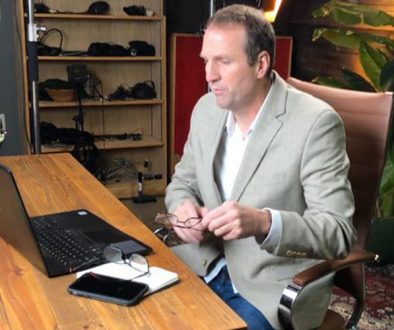We can win the battle against addiction…It just takes some VUJA DE!
“The starting point is curiosity: pondering why the default exists in the first place. We’re driven to question defaults when we experience vuja de, the opposite of déjà vu. Déjà vu occurs when we encounter something new, but feel as if we’ve seen it before. Vuja de is the reverse—we face something familiar, but we see it with a fresh perspective that enables us to gain new insights into old problems” (Grant, page 27,from the book Originals)
Everything is NOT OK! Times are tough in this struggle to help those with substance use disorders. The Opioid “epidemic” is getting headlines these days. According to the CDC more people die from accidental overdose than any other accidental cause. In America 24 million people meet criteria for substance use disorder. Of those 24 million only 10% will access help at any given time. The financial costs associated with substance use disorders approach $428 billion per year. Many people have found recovery, however, the unfortunate reality is this group represents a very small fraction of the people in need.
Why are we losing the battle against addiction? The answer goes well beyond the standard explanation of evil insurance companies and incompetent government leadership. Having the right target is essential if we are going to solve the addiction epidemic! Right now we are at a crossroads in our country. The attention on substance use disorders is at a higher level now than any other time in our history. Of course this is focused on the opioid epidemic. The most honest thing that can be said is that heroin has become mainstream. Middle class white kids are dying, middle-age men and women are dying. Society can no longer conveniently look the other way.
As I write this blog post the Comprehensive Addiction and Recovery Act is being debated in congress. This bill will earmark money for treatment, medication assisted treatment and (THANKFULLY) recovery community organizations. In addition, congress is in the process of confronting insurance providers around the issue of reimbursement and parity. Certain insurance companies are going to be called on the carpet due to denial of benefits. This is all wonderful news. However, I can’t help but wonder: How does this all lead to more people getting help?
Money For Treatment Is Wonderful: Both CARA and the parity/reimbursement issue will, theoretically, increase access to treatment. However, if you believe the national research, the issue is not access. The issue is lack of problem recognition. The federal government, through the Substance Abuse and Mental Health Services Association (SAMHSA), conducts annual survey (National Household Survey of Drug Use and Health-NHSDUH) that addresses substance use disorders. This includes information regarding how many people have a need for treatment and how many of these people access help. For decades the numbers have been consistent; only 10% of those needing support are engaged in services at any given time. The NHSDUH digs a little deeper and ask those not accessing help: Why did you not get help? The results are astounding.
- In 2013 only 1.6% recognized need and could not find help (access problem).
- Whereas 95.5% cited “did not feel treatment was necessary” as the reason for not getting help (recognition problem).
Therefore we need to focus on increasing problem recognition: Stating the obvious; if we want to increase the number of people with a substance use disorder receiving help we will need to tap into the 95.5% who did not feel they need treatment. Increasing access for the 1.6% who were willing is great but in reality it is a drop in the bucket. We need to find a way to change the mindset of the 95.5%; not wait until they “magically” move into the “want help” category. It is unacceptable to sit back and wait for people to hit bottom. There is no other disease where you wait for it to get worse prior to intervening.
If this were a business we would be focusing on “untapped market”: This approach is a win-win for all involved. From a business standpoint treatment providers will see increased participation in services if we find a way to tap into the 95.5%. If we intervene earlier less people will die, families will be preserved, businesses will be more productive, healthcare costs will plummet and incarceration rates will fall. Everyone wins if we fundamentally change our current delivery system. As Maia Szalavitz wrote: “The late addiction/recovery author Alan Martlatt used the analogy of comparing the rehab industry to other customer-focused business. A car company faced with declining sales and lack of consumer interest would not complain that customers are “in denial” about the quality of their vehicles. Nor would it try to have the government arrest people who refused to buy their cars. Instead, they’d improve their offerings—or, at the very least, their marketing and consumer outreach”. The substance use disorder service provider needs to find ways to engage this untapped market. This could be done via non-traditional service location (community and in-home). In addition, providers could be less confrontational and willing to meet the patient where they are at. Furthermore, a collaborative recovery planning process makes sense rather than a prescriptive one-size fits all approach.
Making these changes could be relatively simple: There is a precedent for behavioral health services to be delivered in non-traditional ways and non-traditional settings. For example, in some states Behavioral Health Rehabilitation Services are consistently delivered in the home. Services for kids are consistently delivered in the home. Other healthcare is delivered in the home. Why not substance use disorder treatment? This type of change would, however, require the overturning of folklore and myths around addiction: The idea that someone has to hit bottom to find recovery is a cliché. The same could be said for the concept that a person has to want it for themselves in order to recover. There are well researched and tried and true methods to increase motivation and engage a resistant client. Motivational interviewing is a modality that many service providers claim to utilize but few actually embrace. True motivational interviewing involves meeting the client on his or her terms.
When we focus our efforts on engaging everyone in need rather than “helping the willing” you will see immediate and significant results. It is not a stretch to say 20%-30% of the disengaged group could be engaged in a relatively simple way. The return on investment in terms of time and money would be stunning. The example below provides an illustration of this new way of thinking:
- We all know the story of the individual who goes off to rehab, is a treatment superstar, comes home, starts IOP and then, for some reason, “quits” IOP and “quits” attending mutual support groups. This happens all the time. This person stays away from counseling and mutual support for a wide variety of reasons; anger toward another member, insurance money “runs out”, they find a job, they get bored with the meetings, etc…
- Eventually they have a recurrence of substance use and a profound sense of failure, embarrassment, shame and guilt enters the picture. Some will “come back”. Some have a special relationship with a person in mutual support and that person will “bring them back”.
- But the overwhelming majority isolate themselves. As time goes by it becomes more and more difficult to re-engage in the recovery process. If the system was set up for assertive and aggressive outreach a professional service would be utilized to intervene in these circumstances.
- A referral could be made by the family, a therapist, a fellow in recovery and a Certified Peer Recovery Support Specialist could begin the outreach process. Phone calls, text messages, community visits and even home visits could be utilized to re-engage the person. An overwhelming majority of these disengaged individuals would be incredibly grateful for the outreach. They will be relieved to learn there are multiple pathways to recovery and many will reinitiate their recovery process. At FAVOR Greenville we know this is true because we have been doing phone coaching for over 2 years. We have seen the way people respond to a warm voice or kind text message.
This is just one example. Certainly there will be more difficult cases. Certainly there will be those that cannot be re-engaged despite extensive efforts. What we need to do is challenge conventional wisdom around the recovery process. We need to get away from the punitive, confrontational mentality that drives so many of our traditional interventions. If we think addiction is a brain disease then let’s act accordingly.
FAVOR Greenville is leading the way in driving innovative and ground breaking approaches that directly confront the current drug epidemic. Our Assertive Community Engagement program (ACE) will be launched in April. We will be providing staff intensive recovery coaching services focused on engaging all those in need. We intend to change the paradigm around the delivery of recovery support services. Stay tuned for details. See www.favorgreenville.org for more information.



March 26, 2016 @ 5:22 pm
Thank You, I needed to see that I wasn’t alone. I have been trying to change my ways and every time I turn around there is another obstacles to overcome. I feel like I have broken away from the clutches of Death but there is still only maybe 6-8 weeks to get through before I will be able to get my life going without the need to have to rely so heavily on someone else’s kind heartedness. When I get free of the feeling of dispare, guilt and shame I know that I will be a better person. I already look at life through a different lens. I value things alot differently. I know what I want to do/ be for the first time in my life!! I have found my Passion! It’s sad that it took so long, but I am almost there. I just have to be able to finish the last few steps of a decades journey into self reawaken! I want to be able to reach the other side (wiping away tears). O the longing I feel to be free. I look forward to meeting you in the near future. Thank You Again, I will be reading more of your work.
March 26, 2016 @ 11:10 pm
Keep in touch. Sounds like you are on the stretch run. Will be own your own two feet soon.